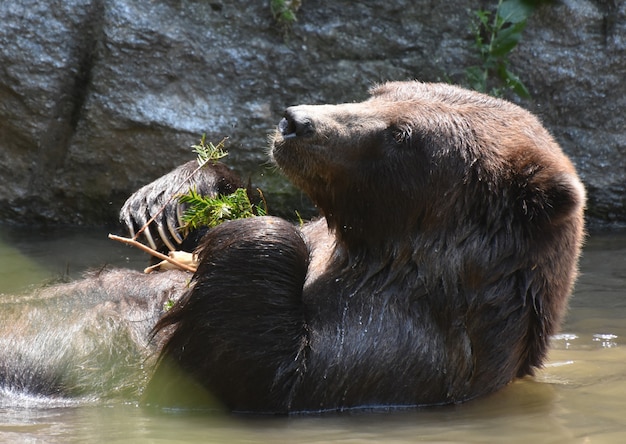Discover Fascinating Trivia about Grizzly Bears

Did you know that grizzly bears can weigh up to 1,500 pounds?
Grizzly bears have an incredible sense of smell, which helps them locate food from miles away.
Despite their large size, grizzly bears are incredibly agile and can run up to 35 miles per hour.
Grizzly bears are excellent swimmers and can easily cross rivers and lakes.
Unlike other bears, grizzlies are solitary animals and prefer to live alone.
Grizzly bears have a hump of muscle on their shoulders, which gives them additional strength for digging and climbing.
These bears are known for their distinctive shoulder hump and thick, shaggy fur.
Grizzly bears have a keen sense of hearing, which allows them to detect sounds from miles away.
They have a lifespan of around 20 to 30 years in the wild.
Grizzly bears are omnivores and have a varied diet that includes fish, berries, nuts, and even small mammals.
During hibernation, grizzly bears can lose up to 30% of their body weight.
Grizzlies have a strong maternal instinct and are extremely protective of their cubs.
Grizzly bears can stand on their hind legs, which allows them to have a better view of their surroundings.
These majestic creatures can be found in North America, specifically in parts of Canada and the United States.
Grizzly bears have a unique set of long, curved claws that enable them to dig for food and create dens.
Their fur can range from light blonde to dark brown or black.
Discover Fascinating Trivia about Grizzly Bears part 2
Despite their large size, grizzly bears are surprisingly fast and can outrun humans over short distances.
Grizzlies play a crucial role in seed dispersal as they consume berries and then spread the seeds through their scat.
They have an excellent memory and can remember food sources and travel routes for years.
Grizzly bears are highly adaptable and can live in a variety of ecosystems, including forests, mountains, and grasslands.
The scientific name of the grizzly bear is Ursus arctos horribilis.
These bears are known for their immense strength and have been observed flipping over huge rocks in search of food.
Unlike other bear species, grizzly bears do not climb trees often.
The size of a grizzly bear’s territory can vary greatly depending on the availability of food.
Grizzlies have a slow reproductive rate, with females only giving birth to one or two cubs every few years.
Grizzly bears have been revered in Native American cultures as powerful symbols of strength and wisdom.
In the wild, grizzly bears are known for their ability to coexist with other large predators, such as wolves.
They are considered a keystone species, meaning they play a critical role in maintaining the balance of their ecosystems.
Grizzly bears have an excellent sense of balance, which allows them to navigate steep slopes and rocky terrain.
They have a layer of fat under their skin, which helps them stay warm during the harsh winter months.
Grizzlies are known for their unique fishing technique called snorkeling, where they submerge their heads underwater to catch fish.
Despite their intimidating presence, grizzly bears are generally not aggressive towards humans and prefer to avoid conflict.
Grizzly bears have been known to cover themselves in dirt and leaves in order to camouflage themselves while hunting.
They have a specialized digestive system that allows them to efficiently process tough plant materials like roots and tubers.
Grizzly bears have an incredibly strong bite force, which helps them crush bones and rip apart carcasses.
Grizzlies have a strong sense of territory and will mark their boundaries by rubbing against trees or leaving scratch marks.
Grizzly bears are excellent climbers and can easily scale trees if needed.
They have a good sense of taste and can easily differentiate between different types of food.
In the wild, grizzly bears have been observed engaging in playful behavior, such as wrestling and rolling around.
These bears are highly adaptable and can adjust their behavior and diet depending on the availability of resources.
Grizzlies have a slow heart rate during hibernation, which helps them conserve energy.
Despite their size, grizzly bears are surprisingly good at stalking and ambushing their prey.
Grizzlies have an excellent sense of balance, which allows them to stand on their hind legs for extended periods of time.
These bears are known for their immense strength and have the ability to take down large prey such as moose or bison.
Grizzly bears have been the subject of numerous studies and research, which has helped scientists better understand their behavior and conservation needs.

